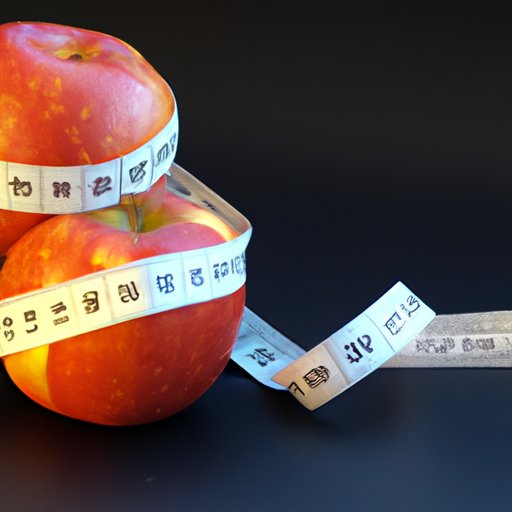
Introduction
Fruit is often viewed as an essential part of a healthy diet, and for a good reason. It is loaded with essential vitamins and minerals that are beneficial for overall health and well-being. However, it can be challenging to determine how much fruit should be consumed daily to optimize benefits while avoiding any negative effects. This article will help you to understand how much fruit to eat each day for a healthy diet.
The Benefits of Eating Fruit
There are countless benefits to incorporating fruit into your daily diet. Fruits are loaded with vitamins, minerals, fiber, and antioxidants. Each type of fruit contains a unique set of nutrients that can help boost immunity, improve digestion, reduce the risk of chronic diseases such as stroke, heart diseases, and some cancers, and keep the body hydrated. Eating fruits can also help control the blood sugar levels and reduce the bad cholesterol in the body.
To experience the maximum benefits of consuming fruits, it is essential to choose whole fruits instead of fruit juices or smoothies. Whole fruits contain the natural fiber present in fruit’s flesh that helps slow down the metabolism and improves digestion. Replacing processed snacks with fruit can also help in weight management and contribute to a healthy diet.
Understanding the Recommended Daily Fruit Intake
The recommended daily fruit intake varies based on age, gender, and activity levels. However, the general guideline is to consume at least two servings of fruits daily for adults. The serving size of fruits is usually one medium fruit or 1/2 cup of fruit juice (without sugar added).
Based on the United States Department of Agriculture (USDA), daily fruit intake may vary based on calorie intake and activity levels of the individual. For example, adults who consume 1,200 to 1,400 calories daily and are less physically active may need only one to one-and-a-half cup servings of fruit per day, while those consuming 2,000 to 2,400 calories a day and moderate to active physical activity may require two servings of fruits per day.
It is important to note that fruit intake should not replace other essential food groups in your diet. A balanced diet including whole grains, lean protein, dairy products, and vegetables is required to sustain a healthy body and prevent nutrient deficiencies.
The Risks of Overconsumption
While fruit consumption is essential for a healthy diet, overconsumption of fruit can lead to concern as well. Overconsumption of sugary fruits can cause blood sugar spikes in individuals, especially those with underlying conditions like prediabetes or diabetes. Consuming too many fruits that are high in natural sugar, such as bananas, grapes, mangos, or pineapples, can quickly add up in calories – leading to weight gain.
Overconsumption of fruit juices or smoothies can also pose health risks since some brands may have added sugars to enhance their sweetness. Fruit juices can also lack the natural fiber present in whole fruits, causing a sudden surge in blood sugar levels, thereby leading to an increase in bad cholesterol in the body due to excess sugar intake.
To monitor your fruit intake adequately, try to make healthy choices about what fruits you consume. Opt for fruit with lower sugar content such as berries, apples, and oranges, and limit your intake of high-sugar fruits like bananas, grapes, and pineapples.
Fruit as a Part of a Balanced Diet
Fruits, like most food groups, are most beneficial when included in a well-balanced diet. It is essential to consume an assortment of nutrient-rich foods daily for maximum benefits to the body. Fruits are great sources of vitamin C, potassium, and fiber. However, consuming solely fruit to meet daily nutrient intake requirements may not provide all of the essential nutrients required by the body.
It is essential to pair fruits, such as berries, kiwi, or oranges, with other breakfast staples like yogurt or oatmeal or pair it with leafy greens and lean protein at lunch or dinner. Fruits can also serve as a great snack substitute for processed snacks. Adding fruit to salads, smoothies, whole-grain sandwich or wrap can provide a significant protein and nutrient boost.
Tips for Maintaining a Healthy Fruit Intake
Here are some tips for maintaining a healthy fruit intake:
- Buy when in season: Fruits that are in season are affordable, flavorful, and provide maximum nutrient benefits. Buying such fruits helps to offer variety in a healthy diet and is a way to ensure that fruits are fresh when they are consumed.
- Meal Planning: Plan ahead and include fruit in most meals. Meal planning can ensure that you are getting the right amount of fruit in your daily diet. Add slices of fruit to your smoothie blend such as berries and bananas, or add strawberries to your yogurt in the morning.
- Snack on Fruits: Fruits make an excellent snack. Add fresh fruits to your nuts or yogurt or have fruit cups or sliced fruits handy to eat as a quick snack.
- Choose whole fruits instead of juices: Avoid packaged juices or fruit juices containing added sugars and opt for whole fruits as they provide essential fiber and nutrients and are comparatively lower in calories.
- Experiment in the Kitchen: Be creative with your fruit recipes and try out new dishes such as fruit kabobs, smoothie bowls, or fruit salsa.
- Appeal to picky eaters: Offering fruit in smaller portions can encourage picky eaters to try out new varieties. For example, offering colorful fruits like strawberries, blueberries and raspberries can be combined to provide a sweet treat for kids.
Conclusion
Consuming fruits is essential for a healthy and well-balanced diet. To maintain a healthy fruit intake, it is essential to eat a variety of nutrient-dense fruit and incorporate them into healthy meals and snacks. While there is no one-size-fits-all approach to the recommended daily fruit intake, it is essential to monitor and ensure that you are getting the essential daily nutrients in balance with other food groups in your diet.




